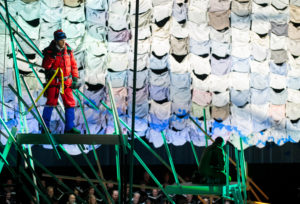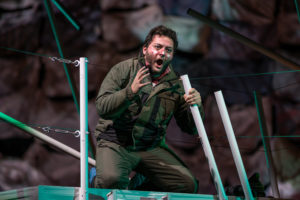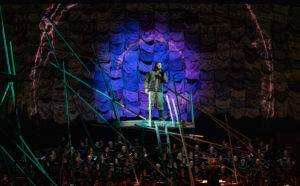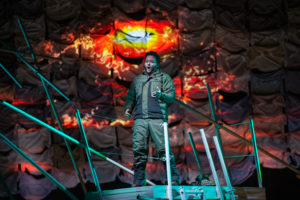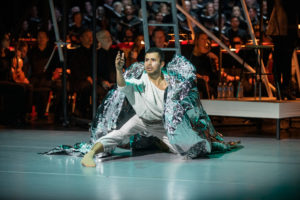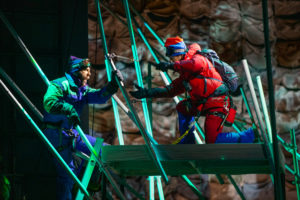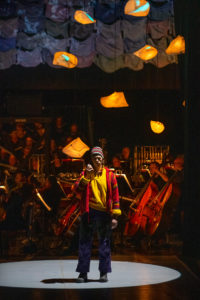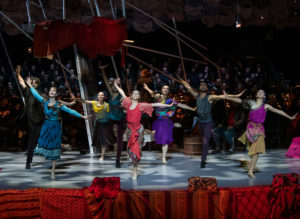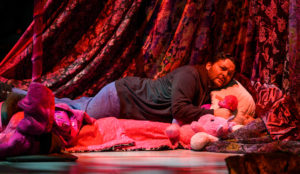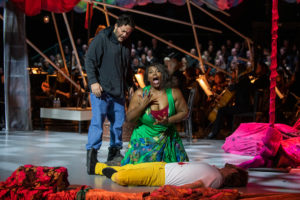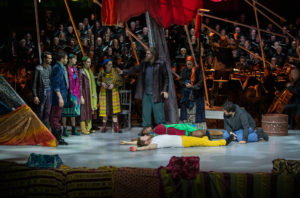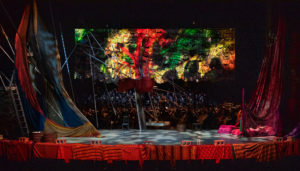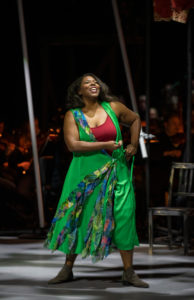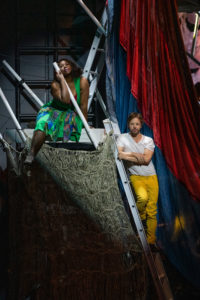CHICAGO OPERA THEATER
UPS THE ANTE AND PUSHES THE LIMITS
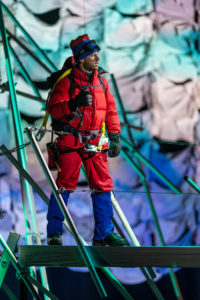 The bad news: Everest and Aleko, Chicago Opera Theater’s engrossing double bill at Millennium Park’s Harris Theatre, closes this weekend. The good news: This dynamic duo more than earns a review of record. Enterprisingly mounted by a boundary-breaching company and featuring a massive chorus and orchestra and eight soaring talents, the whole was greater than its parts, terrific as they were on their own.
The bad news: Everest and Aleko, Chicago Opera Theater’s engrossing double bill at Millennium Park’s Harris Theatre, closes this weekend. The good news: This dynamic duo more than earns a review of record. Enterprisingly mounted by a boundary-breaching company and featuring a massive chorus and orchestra and eight soaring talents, the whole was greater than its parts, terrific as they were on their own.
Featuring 140 members of Chicago’s established and admired Apollo Chorus, performers from the A&A Ballet, and a 70-person orchestra conducted by the wonderful Lydia Yankovskaya, this tandem triumph was ambition on steroids. Though C.O.T. could not have found two more different one-act operas to revive, happily enough they testify to the power of music to tell any story deeper than words.
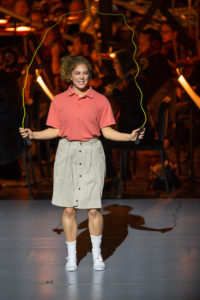 Composer Joby Talbot and librettist Gene Scheer’s 2014 Everest recounts, with more simultaneity than chronology, two harrowing deaths and one miraculous survival on top of the world’s tallest mountain in 1996, as memorably described in Jon Krakauer’s best-seller Into Thin Air.
Composer Joby Talbot and librettist Gene Scheer’s 2014 Everest recounts, with more simultaneity than chronology, two harrowing deaths and one miraculous survival on top of the world’s tallest mountain in 1996, as memorably described in Jon Krakauer’s best-seller Into Thin Air.
“Is this how it ends?” yields to “Is this how it begins?,” and we’re in the thick of it. Performed on a teetering scaffolding set against a huge climbing wall ablaze with textiles, video projections, and lightning-like profiles of the Himalayas, the 70-minute piece juxtaposes the fates of three climbers and their loved ones praying for a non-lethal outcome. As they sing the stuff they said, a huge, ghostly, behind-the-scenes chorus delivers questions and wry reflections on mortality, and embody the souls of past victims waiting for “another name.”
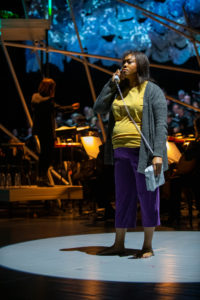 Their anguish conveyed in harsh or resigned arias and duets, dissonant and electronic, the intertwined fates of three summiteers come out: Houston pathologist Beck Weathers (Aleksey Bogdanov), who’s “followed” by his daughter Meg (Anna Laurenzo) and who will survive to deal with the effects of horrible frostbite; famous mountain guide Rob Hall (Andrew Bidlack), revealed in his final passionate long-distance talks with his beloved and expecting Jan Arnold (Zoie Reams); and Doug Hansen (Zachary Nelson), a sweet-faced postal worker whose adventure of a lifetime has turned to nightmare.
Their anguish conveyed in harsh or resigned arias and duets, dissonant and electronic, the intertwined fates of three summiteers come out: Houston pathologist Beck Weathers (Aleksey Bogdanov), who’s “followed” by his daughter Meg (Anna Laurenzo) and who will survive to deal with the effects of horrible frostbite; famous mountain guide Rob Hall (Andrew Bidlack), revealed in his final passionate long-distance talks with his beloved and expecting Jan Arnold (Zoie Reams); and Doug Hansen (Zachary Nelson), a sweet-faced postal worker whose adventure of a lifetime has turned to nightmare.
As staged by Dylan Evans, this scary work brutally delivers the isolation of unwilling victims as they discover they’re caught up in a calamity that pits the indifference of granite crags of the Hillary Step against the agonies of those left behind. The work ends with a horrible rush of dark sound, as much like the trump of doom as a Himalayan avalanche.
——————————
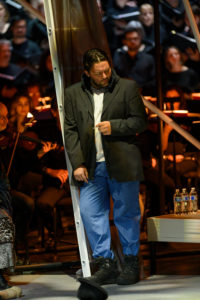 Performed in Moscow in 1892 (with Tchaikovsky in the audience) and inspired by Pushkin’s The Gypsies, Sergei Rachmaninov’s first opera Aleko much resembles Carmen: It’s the tale of a freedom-loving gypsy enchantress who seduces a man out of respectability and reputation and endures a horrible demise.
Performed in Moscow in 1892 (with Tchaikovsky in the audience) and inspired by Pushkin’s The Gypsies, Sergei Rachmaninov’s first opera Aleko much resembles Carmen: It’s the tale of a freedom-loving gypsy enchantress who seduces a man out of respectability and reputation and endures a horrible demise.
Rachmaninov gives the Romani migrants the sweetest choruses extolling the moon and the night. They come off as independence-craving nomads who cherish lives and love as open as the sky above.
In contrast, the not so free-spirited Russian 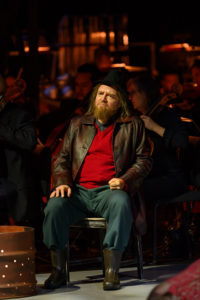 interloper Aleko (magnificent Aleksey Bogdanov) is convulsed with possessive jealousy over his beloved Zemfira (fiery Michelle Johnson). Totally out of love with this controlling bully, she’s in the throes of a characteristically transient ardor for a young gypsy (Andrew Bidlack, who sings a lovely ode to everything). As witnessed by the tribe’s elders (Gustav Andreassen and Olga Rafalo), the double murder that cruelly resolves this impasse is one more reason to dampen the campfires and move on.
interloper Aleko (magnificent Aleksey Bogdanov) is convulsed with possessive jealousy over his beloved Zemfira (fiery Michelle Johnson). Totally out of love with this controlling bully, she’s in the throes of a characteristically transient ardor for a young gypsy (Andrew Bidlack, who sings a lovely ode to everything). As witnessed by the tribe’s elders (Gustav Andreassen and Olga Rafalo), the double murder that cruelly resolves this impasse is one more reason to dampen the campfires and move on.
The 19-year-old Rachmaninov also inserted a long three-part ballet, choreographed by Alexei Kremnev, that gracefully enacts the spontaneous efflorescence of this gypsy camp. Its tents are colorfully suggested by iridescent tapestries by designers Greg Mitchell and Olga Maslova, who also does the romantic costumes.
In less than an hour, Rachmaninov conjures up both a way of life and path of death on the wind-swept steppes, aided here by flashes of works by Romani painter Henrik Kallai.
Bravo, tutti!
Everest and Aleko
Chicago Opera Theater
Harris Theater, 205 E. Randolph
ends on November 17, 2019
for tickets, call 312.704.8414
or visit Chicago Opera Theater
for more shows, visit Theatre in Chicago

